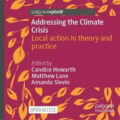Addressing the Climate Crisis: Local action in theory and practice
Book by Candice Howarth on 6 Oct 2021
This open access book brings together a collection of cutting-edge insights into how action can and is already being taken against climate change at multiple levels of our societies, amidst growing calls for transformative and inclusive climate action.



